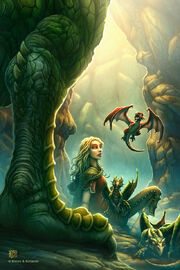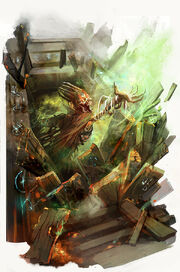The Elder Gods were the first mortals to achieve immortality and thus the first gods. They are Mordun, formerly a dwarf; Tabata, formerly an odlander; Vekumm, formerly a sturmhalter; and Zahar, also formerly an odlander.

Tabata in physical form surrounded by dragons
Each of them achieved their immortality through different means: Mordun replaced his organic body with a mechanical one powered by steam, gears and arcana; Tabata achieved a state of perfect inner peace, which allowed her mind --already somewhat detached from her body due to being an odlander-- to escape the confines of her physical body and expand to every region of the Earth; Zahar trapped his soul within a material receptacle infused with powerful preservation arcana, which enabled him to travel to the Undearth and back on his own, thereby becoming a sentient undead; and Vekumm combined some of Zahar's ideas with some of his own and trapped his own soul in the barrier between the Earth and the Undearth, never fully inhabiting either plane.
In the common calendar of Earth, the Third Age began with the ascension to immortality of Mordun, who was the first to become immortal.
The new religions[]
The shattering of the old pantheons[]
unThe rise to immortality of four humanoids shattered the foundations of the Earth's religions by proving that there had been no gods previously and that mortals could achieve godhood if they became powerful enough. (The word "god" itself had to be redefined, and linguists quickly reached the consensus that immortality was a prerequisite for godhood.) Most religions disappeared almost overnight, but sentients were quick to create new ones, this time worshipping real gods.

Mordun replaced his organic body with a mechanical one
Mortals were quick to forget that their new gods had once, not too long ago, been mortal as well; even Mordun's constant reminders were unheeded, misinterpreted as suggestions that mortals could achieve immortality if they worked hard enough for it. What this work was about was an intensely debated topic at first, with different currents following different gods or groups of gods and establishing different guidelines based on this choice of prime deity.
The fact that all four Elder Gods hail from Sazandora has been the source of much speculation and debate among theologists. Some early thinkers speculated that the arcane threads permeating the world were stronger on that continent, but experiments have failed to confirm this. A few dismiss the fact as coincidence.
Some of the ancient religions persist still, especially in Lleimilla, where people refuse to embrace a religion brought to them by the "invading" dwarves from overseas.
The Great Balancing Act[]
The first of these religions considered the gods part of a single, universal act of balancing: Zahar was a god of life and death whose methods were generally clean and orderly, while Vekumm, also a god of life and death, acted impulsively and chaotically; these two deities balanced each other out, since order and chaos must always be balanced.

Vekumm's eye and hand are the main sources of his vast power
Some versions saw both of them as agents of chaos, while Mordun, god of creation, was the agent of order and Tabata, the universal conscience, was the force behind the other three gods.
Alternatively, Zahar held the balance between life and death while Mordun and Vekumm kept the balance between creation and destruction and Tabata constituted the guiding force behind it all.
The single-deathgod view[]
For decades the Forger and the Necromancer worked together to discover new ways to shape reality. They created many interesting things together, including sentient constructs, which they both consider their greatest achievement since immortality.
However, Mordun quickly grew weary of the constant worshipping of mortals and of their lack of attention when he asked them to stop regarding him as anything more than a scientist. He also found it abhorrent that Zahar did not try to dissuade mortals from worshipping him --although the Lich did not encourage them either-- and that Vekumm actively pursued this worship. Eventually, the Self-Forged locked himself up in his Library of Ages to study the Universe by himself, emerging occasionally only to study something particular and communicating solely with his constructs and with Tabata, the only intelligent being on the Earth who had not disappointed him.

Zahar's immortality stems from his undead condition
This resulted in the disappearance of the religions which saw Mordun as one of the agents of balance. Mortals returned to viewing only Zahar and Vekumm as such, although, with these two gods having worked together for so long, many nascent religions began to teach that Zahar and Vekumm were two of the many names of a single god associated with life and death.
In these religions, there is no talk of balance, only of gods associated with different aspects of the Universe: Zahar/Vekumm is the god of life and death, Tabata is the goddess of the mind, and the Forger is the god of creation and knowledge.
Identification of the old pantheons with the new one[]
Some currents go as far as saying that Mordun forged the world and the creatures in it, Zahar/Vekumm gave those creatures life, and Tabata made them capable of thinking.
Exponents of this point of view often attempt to validate their beliefs by citing ancient religions from the Second Age, twisting their words so they resemble what they claim to be the truth, and finding similarities between their teachings and the ancient religions.
The gods' view on religion[]
The Elder Gods themselves have differing views on the question of their godhood. Mordun sees himself and the others as natural creatures who, by using their knowledge of the laws of nature, achieved immortality. Tabata sees herself as a mortal still, albeit a mortal who was able to forsake her body and exists freely throughout the Earth. Vekumm delights in his immortality and his vast power, referring to himself and the others as gods and basking in the glory of mortals' worship. Finally, Zahar views himself as the guiding hand of balance and the guardian of the barrier between the Earth and the Undeath; he regards the others in a similar fashion, each with his own domain -- mind, knowledge, and death.